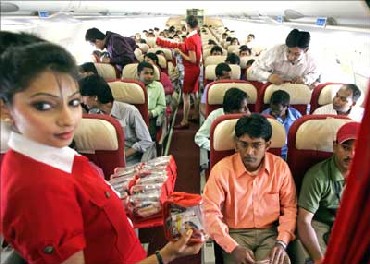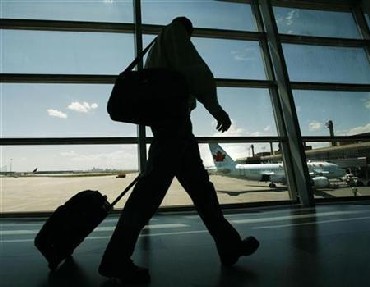Subir Roy
It was the second time in a couple of months that this had happened. The IndiGo flight had arrived before time.
What made it worse was that the new Bangalore airport delivered the checked baggage within what seemed like minutes since the time we stood there waiting for it. So we were out of the airport almost 20 minutes before what we had calculated.
Normally, that should have been wonderful but the bullock cart part of India moved at its own pace.
By the time our car negotiated the many bottlenecks on the road to the airport and arrived to pick us up, we had waited longer for it at the kerbside than the time gained by the before-time exit from the airport.
...
Are the glory days over for the aviation industry?
What struck home was the predictability emerging about the way the airline and the airport worked in India, where things often run late and, more bothersome than that, pan out in an unpredictable manner; much like the freakish before-time arrival of the Duronto Express in a sea of chaotic arrivals of other trains.
If getting something right is difficult, it is more so in an environment in which most other things do not function predictably.
Much as I love to travel by train, and the concession available for senior citizens makes train travel even more attractive, lately I have been forced to travel mostly by plane because trying to get a railway reservation even quite a bit before the journey date has invariably resulted in a wait-listed ticket.
...
Are the glory days over for the aviation industry?
My family and I have often found that the difference between railway fare and the cost of a cheap air ticket booked early is not all that great and what tilts the balance is the usual downside of having to spend more than a day on a train, not knowing what the condition of the loo would be in the morning when you must use it.
My journey by plane in life began rather inauspiciously four decades ago when I boarded a flight to Gauhati, as it was then called, on way to Shillong to take up a trainee's posting in State Bank of India.
I could not fasten the seat belt; I didn't know how to and felt too embarrassed to ask the air hostess who seemed even younger than I was.
To cover up my failing, literally, so that she could not see that I was a dehati who was not securely fastened, I spread out a newspaper on my lap.
...
Are the glory days over for the aviation industry?
That stratagem worked but, as often happens on that route I came to know later there was soon considerable air turbulence and the "fasten seat belt" sign came on. I spent the next 15 minutes totally tense hoping that the plane did not strike an air pocket and I did not hit the roof, literally.
My first travel outside the country was as troublesome and even more dramatic. Thinking that enough time was left before the late-night departure, I enjoyed a leisurely dinner and sat down to look at my air ticket carefully.
My blood froze. I had misread the departure at 00.30 hours to mean 3 am when it was actually 30 minutes past midnight.
People air-dash but I dashed faster over surface from Centaur Hotel to Bombay airport next door than anyone before and reached the counter just when the clerk was locking up to go away.
...
Are the glory days over for the aviation industry?
Eventually, he and I literally ran across the tarmac to the plane lugging my two suitcases. The greatest mortification was the announcement as soon as I took my seat, "We will now take off and so sorry for the delay" (Air India was a different kind of carrier then) with all the passengers turning around to take a look at the culprit who was responsible for the delay.
When private airlines arrived on the scene I took a long time to get on to them. My point was, an airline must have clocked at least a sizeable number of accident-free flying hours before I can have sufficient confidence to travel by it.
So I hung on to Indian Airlines even when many of my friends were happily enjoying the services of ModiLuft or Jet Airways. Now, it is the opposite. Ever since the Mangalore crash, I hesitate to travel by Air India even if the fare is right.
...
Are the glory days over for the aviation industry?
The ultimate irony of today's air travel scene is that most of the firms that are intensively competing with each other to offer easy availability and service that was unimaginable earlier are not making money.
Paramount is gone and maybe down the line a loss maker or two will change hands. Even then, competition will not go away and it is difficult to foresee a situation in which several of them will be making good money.
The customer or traveller is king but with oil prices likely to keep going up over time, it is difficult to see how long he will remain the king of good times.
...
Are the glory days over for the aviation industry?
Photographs: Reuters
Ever since "open skies" came in the US, airlines there have struggled to remain afloat while competing intensively. Though there have been a few successes, many have gone belly up.
Looking at the scene, European state-owned carriers had then argued against "open skies" policies.
Today, after much restructuring and with budget airlines offering their own value proposition, making money in commercial air travel remains a difficult goal.
As I waited for our car at Bangalore airport on arriving before time, I felt things couldn't remain the way they are right now. The combination of affordability, choice and quality will have to give way somewhere sooner or later.









article